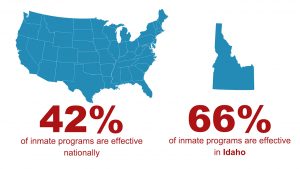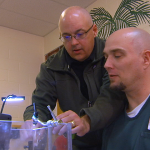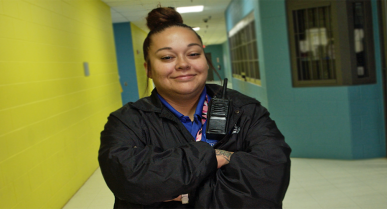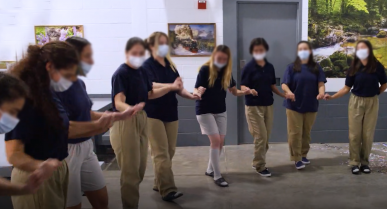State Audit Shows Idaho CAPP is Keeping People out of Prison
“It was really exciting,” says Idaho CAPP Deputy Warden of Programs Darcy Acosta. “I knew we did well. I didn’t know we were going to do that well.”
MTC’s Idaho CAPP has a big reason to celebrate.
“As a warden,” adds Brian Finn, “it makes me obviously proud of my staff. It was a state audit of state facilities and to come in number one—it’s just a testament to the dedication of the front-line staff and administration have here every day.”
Just a few years ago, the Idaho Department of Correction completely revamped the types of programs offered to inmates. Today they use only evidence-based programs.
Jennifer Luther, who is the senior director of corrections programs for MTC, which operates the facility, says the programs used at the facility are backed by decades of research.
“We have about 40 years of research right now, and we have meta-analysis that tell us there’s a recipe for helping people to be rehabilitated through corrections.”
And that recipe has worked in the state and especially at Idaho CAPP. Just ask the men in the programs.
Kaelene O’Shea says, “I think CAPP is doing really, really well in getting to the nitty gritty of people’s individual issues and have them see that there’s a better way.”
“It’s helped me to address a lot of things that I’ve needed to address from my past: failures, triggers,” adds Jesse Monton.
The state recently audited all of its facilities, including Idaho CAPP, to see if the programs were truly accomplishing their primary objective—keeping offenders from re-offending.
“Our goal in corrections,” stresses Luther, “is to reduce recidivism and when we do that, we keep communities safer and we help people live more fulfilling and successful lives.”
 So how did the state and MTC do? While nationally only 42 percent of inmate programs are effective…in Idaho…that number is nearly 66 percent.
So how did the state and MTC do? While nationally only 42 percent of inmate programs are effective…in Idaho…that number is nearly 66 percent.
And Idaho CAPP came in first place in the state. The audit was based on the University of Cincinnati’s Correctional Program Checklist or CPC…a comprehensive tool that measures a program’s adherence to principles of effective intervention.
“I have seen hundreds of CPC audit results, and I have never seen one that stellar,” says Luther.
Check out how Idaho CAPP scored in the five main categories. This is on a scale from highly effective to ineffective.
Program leadership and development—highly effective
Staff characteristics—highly effective
Treatment characteristics—highly effective
Offender assessment—effective
And quality assurance—effective.
Idaho CAPP even managed to get a perfect score on program leadership and development.
“They had 100 percent! And I have never seen a 100 percent on any CPC score, and I’ve seen a lot of them,” says Luther.
 This fly-tying class is a perfect example of why they received 100 percent. The class was the warden’s idea as a way of rewarding men who were working hard.
This fly-tying class is a perfect example of why they received 100 percent. The class was the warden’s idea as a way of rewarding men who were working hard.
The men love it and have even learned valuable lessons.
“Give me a fish, feed me for a day,” says Sage Williamson, who’s is in the fly-tying class. “Teach me how to tie flies, feed me for my life.”
“We tell them all the time: we want you to succeed,” says Acosta. The goal is to get you home to your family. And we’re going to give you everything we have for that and you need to run with it.”
And these men are running hard.
“All the self-esteem that they actually built up in me,” says Williamson, “that I can overcome. I’ve just got to keep pushing day by day.”
“Practicing in here how I want to live out there,” adds O’Shea. “Not just in a classroom setting but actually having a job at the facility, doing activities as if we were going to do activities out in real life.”
 Franklin Scruggs adds, “Staff here is outstanding. They adhere to your needs. Problems? All you have to do is talk to them and open up and they will do what they can to help you out. They really want to see us go home.”
Franklin Scruggs adds, “Staff here is outstanding. They adhere to your needs. Problems? All you have to do is talk to them and open up and they will do what they can to help you out. They really want to see us go home.”
About Idaho CAPP Facility
Idaho CAPP Facility is accredited by the American Correctional Association—achieving
over 99% compliance for both mandatory and non-mandatory standards in its most
recent audit. Other accreditations and certifications include the Correctional Education
Association, National Commission on Correctional Health Care (NCCHC), and the
Prison Rape Elimination Act (PREA).












